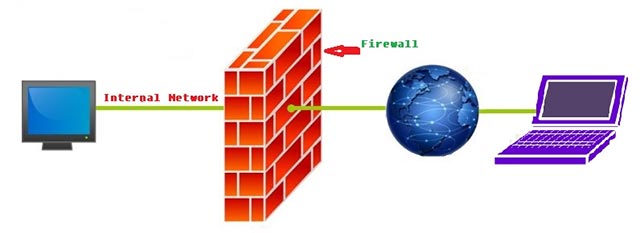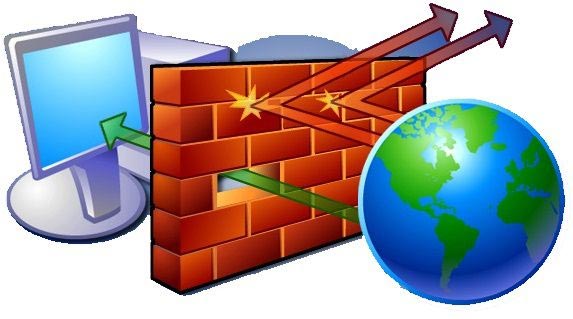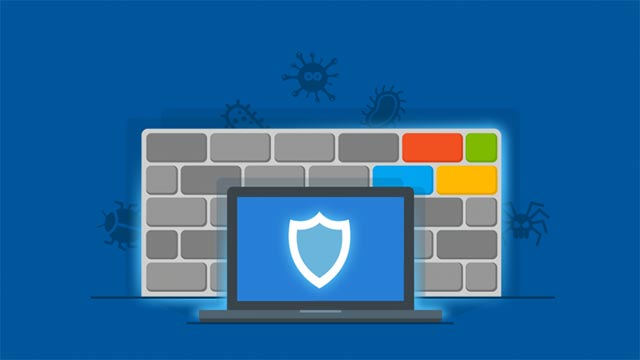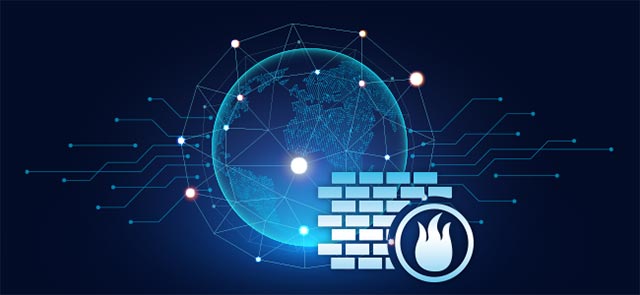7 basic questions about firewalls everyone needs to know
The situation of cyber security is always unpredictable. After a series of recent large-scale network attacks, security on the computer has become even hotter than ever. Besides the anti-virus software and communication ports in the system, you need to pay attention to the important factor in a security system, too - firewall - firewall. Basically, firewalls are the first line of defense for a network security system. Going deeper, you will see a firewall is a network security system, can be based on hardware or software, use rules to control the traffic in and out of the system. The firewall acts as a barrier between a secure network and an unsecured network.

- GandCrab blackmail extinguished after earning $ 2.5 billion worldwide
In practical use, firewalls are a basic security layer for not only personal systems, but also extremely necessary in enterprise security systems. In the past, firewalls were once giant devices, acting as a barrier between the ISP's modem and the enterprise's main network adapter. As mentioned, the firewall's primary task will be to filter traffic, preventing 'suspicious' access packets if it comes from an untrusted node. In other words, only traffic that is consistent with the policy defined in the firewall can access the network, all other traffic is denied. In short, any computer system that is connected to the Internet needs to own a firewall to help manage what is allowed on the network and what is allowed out of the network.
After years of development, coupled with the complexity of network attack methods, the firewall has also gradually improved and become stronger. However, there are still core elements about a firewall system that you must grasp if you want to keep your system safe. In this article, we would like to mention seven basic firewall principles that everyone needs to understand. These are all simple principles that you do not need to have in-depth knowledge of information technology as well as thick experience in the field of network security that can be easily understood.
- [Infographic] 7 effective ways to protect businesses from Ransomware
Basic questions about firewalls
- Does the firewall help protect against viruses?
- Hackers will not be able to recognize my presence behind the firewall?
- Is setting up a firewall a difficult task?
- Just using the firewall is safe enough?
- Can firewalls protect against spam?
- Free firewall system is completely useless?
- Can I not use a firewall?
Does the firewall help protect against viruses?
In theory, thanks to updates on the latest threats, the firewall can detect known viruses and vulnerabilities in network traffic, thereby protecting them from these threats. Even a Small Office Home Office (SOHO) firewall system in many cases is equipped with virus scanning capability. Meanwhile, many enterprise-scale firewall systems used to secure networks do not own this functionality. So can say, anti-virus is not the main function of the firewall. To ensure efficiency, the task of protecting the system against viruses should be 'reserved' for other specialized system hardware or software tools.
Hackers will not be able to recognize my presence behind the firewall?
If the firewall for your organization or business is configured to block all external communications, the normal jailbreak used by hackers will not be able to see the presence of existing servers. in targeted network systems. But anyway, to ensure the overall safety of the system, you should still not leak information on the Internet.
- The cybersecurity tools that every business should know
Is setting up a firewall a difficult task?

No problem! Many firewall systems allow all traffic out of the local network and reject all external traffic from entering the system, even without having to be manually configured. In addition, many firewalls can also be easily configured through the web interface. In fact, saying setting up a firewall is an easy task is not necessarily true because high-end firewall systems that serve in specific network systems are of strategic importance are not easy to configure at all. . However, most firewall systems used in businesses are usually easy to set up and operate.
Just using the firewall is safe enough?
Many organizations and individuals believe that just installing and using a firewall system is enough to secure their network. This mistake often leads to a dangerous idea, assuming that the security risks will be completely eliminated with the presence of a firewall. There's no denying the importance of firewalls in common security barriers. In practice, however, firewalls only protect the network on which they are installed. At the same time, the firewall only protects objects that are within the established range. For example, in the case of Windows XP users, only using Windows Firewall is absolutely not guaranteed because it cannot block external connections. So, if any malware finds a way to get into your computer, there is no way for you to stop its destructive activity. In this case, we recommend using an additional firewall software and setting it up to use in parallel with the Windows XP firewall to ensure maximum security.
Many people think that firewalls can protect against effective viruses, spam and crackers, which is completely wrong and can lead to incalculable consequences.
- Deep Learning - new cybersecurity tool?
Can firewalls protect against spam?

Some small office and home firewall systems (all-in-one) can have spam-fighting features. However, most enterprise-class firewall systems are not equipped with this capability.
Free firewall system is completely useless?
In most cases, software quality will be proportional to the price, or service quality will also depend on the cost to be paid. However, thanks to the popularity of open source software, this is not always true in every situation. For example, OpenBSD can be configured as a free but extremely effective firewall system.
If the company has used a firewall, the desktop at your office will no longer need to set up a firewall. Basically, the company's firewall system can prevent all bad traffic from entering the intranet system. But what if the bad guys are the people working in the company? At that time, use more personal firewalls to protect your own computer. If for some reason malicious code enters your computer, then the personal firewall will work especially well.
- Insider attacks are becoming more and more popular and difficult to detect
Can I not use a firewall?

In fact, using the internet means you already own a firewall system by default, which is a system that includes a router + modem provided by your internet service provider (ISP). , owns NAT feature (translate network address). If it is functionally possible, this is a 'rudimentary' firewall. In addition, all operating systems since Windows XP Service Pack 2 provide users with a firewall system by default. As such, you may not notice it, but in fact the firewall is almost entirely involved in all internet-related tasks, and it is really an essential part of general security.
These are seven basic firewall questions that many people don't understand. Hope the information in the post is useful to you!
